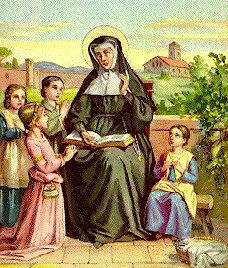1. And he began again to teach by the sea side: and there was gathered to him a great multitude, so that he entered into a ship, and sat in the sea; and the whole multitude was by the sea on the land.
2. And he taught them many things by parables, and said to them in his doctrine,
3. Hearken; Behold, there went out a sower to sow:
4. And it came to pass, as he sowed, some fell by the way side, and the fowls of the air came and devoured it up.
5. And some fell on stony ground, where it had not much earth; and immediately it sprang up, because it had no depth of earth.
6. But when the sun was up, it was scorched; and because it had no root, it withered away.
7. And some fell among thorns, and the thorns grew up, and choked it, and it yielded no fruit.
8. And other fell on good ground, and did yield fruit that sprang up and increased; and brought forth, some thirty, and some sixty, and some an hundred.
9. And he said to them, He that has ears to hear, let him hear.
10. And when he was alone, they that were about him with the twelve asked of him the parable.
11. And he said to them, to you it is given to know the mystery of the kingdom of God: but to them that are without, all these things are done in parables:
12. That seeing they may see, and not perceive; and hearing they may hear, and not understand; lest at any time they should he converted, and their sins should be forgiven them.
13. And he said to them, Know you not this parable? and how then will you know an parables?
14. The sower sows the word.
15. And these are they by the way side, where the word is sown; but when they have heard, Satan comes immediately, and takes away the word that was sown in their hearts.
16. And these are they likewise which are sown on stony ground; who, when they have heard the word, immediately receive it with gladness;
17. And have no root in themselves, and so endure but for a time: afterward, when affliction or persecution arises for the word's sake, immediately they are offended.
18. And these are they which are sown among thorns; such as hear the word,
19. And the cares of this world, and the deceitfulness of riches, and the lusts of other things entering in, choke the word, and it becomes unfruitful.
20. And these are they which are sown on good ground; such as hear the word, and receive it, and bring forth fruit, some thirty-fold, some sixty, and some an hundred.
THEOPHYL. Although the Lord appears in the transactions mentioned above to neglect His mother, nevertheless He honors her; since on her account He goes forth about the borders of the sea: wherefore it is said, And Jesus began to teach again by the sea-side, &c.
BEDE; For if we look into the Gospel of Matthew, it appears that this same teaching of the Lord at the sea, was delivered on the same day as the former. For after the conclusion of the first sermon, Matthew immediately subjoins, saying, The same day went Jesus out of the house, and sat by the sea-side.
PSEUDO-JEROME; But He began to teach at the sea, that the place of His teaching might point out the bitter feelings and instability of His hearers.
BEDE; After leaving the house also, He began to teach at the sea, because, quitting the synagogue, He came to gather together the multitude of the Gentile people by the Apostles. Wherefore it continues: And there was gathered to him a great multitude, so that he entered into a ship, and sat in the sea.
CHRYS. Which we must understand was not done without a purpose, but that He might not leave anyone behind Him, but have all His hearers before His face.
BEDE; Now this ship showed in a figure the Church, to be built in the midst of the nations, in which the Lord consecrates fir Himself a beloved dwelling-place. It goes on: And he taught them many things by parables.
PSEUDO-JEROME; A parable is a comparison made between things discordant by nature, under some similitude. For parable is the Greek for a similitude, when we point out by some comparisons what we would have understood. In this way we say an iron man, when we desire that he should be understood to be hardy and strong; when to be swift, we compare him to winds and birds. But He speaks to the multitudes in parables, with His usual providence, that those who could not take in heavenly things, might conceive what they heard by an earthly similitude.
CHRYS. For He rouses the minds of His hearers by a parable, pointing out objects to the sight, to make His discourse more manifest.
THEOPHYL. And in order to rouse the attention of those who heard, the first parable that He proposes is concerning the seed, which is the word of God. Wherefore it goes on, And he said to them in his doctrine. Not in that of Moses, nor of the Prophets, because He preaches His own Gospel. Hearken: behold, there went out a sower to sow. Now the Sower is Christ.
CHRYS. Not that He went out in space, Who is present in all space, and fills all, but in the form and economy by which He is made more near to us through the clothing of flesh. For since we were not able to go to Him, because sins impeded our path, He went out to us. But He went out, preaching in order to sow the worth of piety, which He spoke abundantly. Now He does not needlessly repeat the same word, when He says, A sower went out to sow, for sometimes a sower goes out that he may break up land for tillage, or to pull up weeds, or for some other work. But this one went out to sow.
BEDE; Or else, He went out to sow, when after calling to His faith the elect portion of the synagogue, He poured out the gifts of His grace in order to call the Gentiles also.
CHRYS. Further, as a sower does not make a distinction in the ground which is beneath him, but simply and without distinction puts in the seed, so also He Himself addresses all. And to signify this, The says, And as he sowed, come fell by the way-side.
THEOPHYL. Take notice, that He says not that He threw it in the way, but that it fell, for a sower, as far as he can, throws it into good ground, but if the ground be bad, it corrupts the seed. Now the way is Christ; but infidels are by the way-side, that is, out of Christ.
BEDE; Or else, the way is a mind which is a path for bad thoughts, preventing the seed of the word from growing in it. And therefore whatever good seed comes in contact with such a way, perishes, and is carried off by devils. Wherefore there follows, And the fowls of the air came and devoured it up. And well are the devils called fowls of the air, either because they are of a heavenly and spiritual origin, or because they dwell in the air. Or else, those who are about the way are negligent and slothful men. It goes on: And some fell on stony ground. He calls stone, the hardness of a wanton mind; He calls ground, the inconstancy of a soul in its obedience; and sun, the heat of a raging persecution.
Therefore the depth of earth, which ought to have received the seed of God, is the honesty of a mind trained in heavenly discipline, and regularly brought up in obedience to the Divine words. But the stony places, which have no strength for fixing the root firmly, are those breasts which are delighted only with the sweetness of the word which they hear, and for a time with the heavenly promises, but in a season of temptation fall away, for there is too little of healthful desire in them to conceive the seed of life.
THEOPHYL. Or, the stony persons are those who adhering a little to the rock, that is, to Christ, up to a short time, receive the word, and afterwards, falling back, cast it away. It goes on: And some fell among thorns; by which are marked souls which care for many things. For thorns are cares.
CHRYS. But further He mentions good ground, saying, And other fell on good ground. For the difference of the fruits follows the quality of the ground. But great is the love of the Sower for men, for the first He commends, and rejects not the second, and gives a place to the third.
THEOPHYL. Sec also how the bad are the greatest number, and the few are those who are saved, for the fourth part of the ground is found to be saved.
CHRYS. This, however, the greater portion of the seed is not lost through the fault of the owner, but of the earth, which received it, that is, of the soul, which hears. And indeed the real husbandman, if he sowed in this way, would be rightly blamed; for he is not ignorant that rock, or the road, or thorny ground, cannot become fertile. But in spiritual things it is not so; for there it is possible that stony ground may become fertile; and that the road should not be trodden down, and that the thorns may be destroyed, for if this could not take place, he would not have sown there. By this therefore He gives to us hope of repentance. It goes on, And he said to them, He that has ears to hear, let him hear.
BEDE; As often as this is inserted in the Gospel or in the Apocalypse of John, that which is spoken is mystical, and is pointed out as healthful to be heard and learnt. For the ears by which they are heard belong to the heart, and the ears by which men obey and do what is commanded, are those of an interior sense. There follows, And when he was alone, the twelve that were with him asked of him the parable; and he said to them,
To you it is given to know the mystery of the kingdom of God, but to them that are without all things are done in parables.
PSEUD-CHRYS. As if He said to them, You that are worthy to be taught all things which are fitted for teaching, shall learn the manifestation of parables; but I use parables with them who are unworthy to learn, because of their wickedness. For it was right that they who did not hold fast their obedience to that law which they had received, should not have any share in a new teaching, but should be estranged from both; for He showed by the obedience of His disciples, that, on the other hand, the others were become unworthy of mystical doctrine. But afterwards, by bringing in a voice from prophecy, He confounds their wickedness, as having been long before reproved; wherefore it goes on, that seeing they might see, and not perceive, &c. as if He said, that the prophecy might be fulfilled which foretells these things.
THEOPHYL. For it was God Who made them to see, that is, to understand what is good. But they themselves see not, of their own will making themselves not to see, lest they should be converted and correct themselves, as if they were displeased at their own salvation. It goes on, Lest at any time they should be converted, and their sins be forgiven them.
PSEUD-CHRYS. Thus, therefore, they see and they do not see, they hear and do not understand, for their seeing and hearing comes to them from God's grace, but their seeing and not understanding comes to them from their willingness to receive grace, and closing their eyes, and pretending that they could not see; neither do they acquiesce in what was said, and so are not changed as to their sins by hearing and seeing, but rather are made worse.
THEOPHYL. Or we may understand in a different way His speaking to the rest in parables, that seeing they might not perceive, and hearing, not understand. For God gives sight and understanding to men who seek for them, but the rest He blinds, lest it become a greater accusation against them, that though they understood, they did not choose to do what they ought. Wherefore it goes on, Lest at any time they should be, &c.
AUG. Or else they deserved this, their not understanding., and yet this in itself was done in mercy to them, that they might know their sins, and, being converted, merit pardon.
BEDE; To those then who are without, all things are done in parables, that is, both the actions and the words of the Savior because neither in those miracles which He was working, nor in those mysteries which He preached, were they able to acknowledge Him as God. Therefore they are not able to attain to the remission of their sins.
PSEUD-CHRYS. But His speaking to them only in parables, and yet not leaving off speaking to them entirely, shows that to those who are placed near to what is good, though they may have no good in themselves, still good is shown disguised. But when a man approaches it with reverence and a right heart, he wins for himself an abundant revelation of mysteries; when on the contrary his thoughts are not sound, he will he neither made worthy of those things which are easy to many men, nor even of hearing them. There follows, And he said to them, Know you not this parable, how then shall you know all parables?
PSEUSDO-JEROME; For it was necessary that they to whom h ho spoke in parables should ask for what they do not understand, and learn by the Apostle whom they despised, the mystery of the kingdom which they themselves had not.
GLOSS. And for this reason, the Lord in saying these things, shows that they ought to understand both this first, and all following miracles. Wherefore explaining it, He goes on, The sower sows the word.
CHRYS. And indeed the prophet has compared the teaching of the people to the planting of a vine; in this place however it is compared to sowing, to show that obedience is now shorter and more easy, and will sooner yield fruit.
BEDE; But in this exposition of the Lord there is embraced the whole range of those who might hear the words of truth, but are unable to attain to salvation. For there are some to whom no faith, no intellect, nay no opportunity of trying its usefulness, can give a perception of the word which they hear; of whom He says, And these are by the wayside. For unclean spirits take away at once the word committed to their hearts, as birds carry away the seed of the trodden way.
There are some who both experience its usefulness and feel a desire for it, but some of them the calamities of this world frighten, and others its prosperity allures, so that they do not attain to that which they approve.
Of the first of whom He says, And these are they who fell on stony ground; of the latter, And these are they which are sown among thorns. But riches are called thorns, because they tear the soul with the piercing of its own thoughts, and after bringing it to sin, they, as one may say, make it bleed by inflicting a wound.
Again He says, And the toil of this world, and the deceitfulness of riches; for the man who is deceived by an empty desire of riches must soon he afflicted by the toils of continual cares. He adds, And the lusts of other things; because, whoever despises the commandments of God, and wanders away lustfully seeking other things, is unable to attain to the joy of beatitude. And concupiscences of this sort choke the word, because they do not allow a good desire to enter into the heart, and, as it were, stifle the entrance of vital breath. There are, however, excepted from these different classes of men, the Gentiles who do not even have grace to hear the words of life.
THEOPHYL. Further, of those who receive the seed as they ought there are three degrees. Wherefore it goes on, And these are they who are sown on good ground. Those who bear fruit an hundred-fold are those who lead a perfect and an obedient life, as virgins and hermits. Those who bear fruit sixty-fold are those who are in the mean as continent persons and those who are living in convents. Those who bear thirty-fold are those who though weak indeed, bear fruit according to their own virtue, as laymen and married persons.
BEDE; Or he bears thirty-fold, who instills into the minds of the elect faith in the Holy Trinity; sixty-fold, who teaches the perfection of good works; a hundred-fold, who shows the rewards of the heavenly kingdom. For in counting a hundred, we pass on to the fight hand; therefore that number is fitly made to signify everlasting happiness. But the good ground is the conscience of the elect, which does the contrary to all the former three, which both receives with willingness the seed of the word committed to it, and keeps it when received up to the season of fruit.
PSEUDO-JEROME; Or else the fruits of the earth are contained in thirty, sixty, and a hundred-fold, that is, in the Law, the Prophets, and the Gospel.
Catena Aurea Mark 4




 She renounced her patrimony in order to observe most perfectly the rule for Franciscan Tertiaries.
She renounced her patrimony in order to observe most perfectly the rule for Franciscan Tertiaries.